- Home
- M G Vassanji
Mordecai Richler Page 15
Mordecai Richler Read online
Page 15
The arguments being made were those of intent, interpretation, and implementation: Should bilingual business signs be allowed, and if so, should they be allowed outside the business or only inside? What should be the permissible relative sizes of the texts in the two languages?
Reading about the conflict these many years later, one might well imagine oneself in the bizarre world of the Asterix comic books. What school boy or girl today would willingly knock their head against this dreary legal, political, provincial wrangle, find a jot of emotion in the issue? But this is where Richler weighed in, though he was led to remark,
A Quebecker born and bred, I suffer from a recurring nightmare that all of us, French- and English-speaking, will one day be confronted by our grandchildren, wanting to know what our generation was about when the Berlin Wall crumbled, a playwright became president of Czechoslovakia, and, after seventy-four years, the Communist Party was overthrown in the Soviet Union.… We will be honor bound to reply, why, in Quebec, we were hammering each other over whether bilingual commercial signs could be posted outside as well as inside. We were in heat, not only in this province, but throughout Canada, over whether or not Quebec could be officially crowned “a distinct society.”
The language conflict to him was a tribal quarrel that degraded both the English and the French speakers. But he was in it because Montreal was his city; he would point out the inconsistencies and pettiness of the nationalist arguments and at the same time highlight some relevant facts in Quebec’s history.
A personal note is due here, from someone who had recently become a Canadian and had a stake in the outcome of the crisis. The issue was not only between the “English” and the “French.”
From the vantage point of Toronto in the 1980s I couldn’t help noticing in the nationalist rhetorics of Canada and Quebec a certain Third World, post-independence echo. This was evident in the prevalent insecurity vis-à-vis the United States, in the boosterism that was employed to counter it, and in Quebec’s identity crisis. Among the top items on the list of any new African or Asian nation of the 1960s was, of course, the promotion of national culture, including the national language. But Canada was an older country. Hence the disappointing sense of déjà vu of a new Canadian upon arrival.
Ironically, and paradoxically, despite a mood of nationalist hostility against immigrants in Quebec and the fact that immigrants had not intended to come to a country threatening to break up, having already witnessed instability in their homelands, it was precisely because of having experienced liberation and nationalist struggles there that the situation of the French Québécois (as of the Aboriginals) could be viewed by them with a certain sympathy.
The French Québécois were a distinct people by their history, their language, and their culture. Their ancestors had been defeated and, an essentially rural people, they had lived under the British flag, dominated by an Anglo-Saxon political and business ruling class. This would be enough to garner them solidarity from much of the world. But it was a sleight of hand on the part of the nationalist demagogues to think of themselves as conquered natives. And isolationism is hardly the answer, when the rest of North America thrives upon the influx of new peoples, when even the European nations acknowledge their changing demographies. Richler, with remarkable perspicacity, notes that:
As things stand now [1992], 40 percent of Canadians are of neither English nor French extraction. Surely within the next thirty, maybe even twenty years, they will form a majority of our population, and our children will not think it out of the ordinary to see Canadians of Chinese, Sikh, African, and Central American descent seated in Parliament alongside those of Polish, Greek, Ukrainian, and Italian origin already in place. Surely, too, these people will demand an end to the wasting tribal quarrel between the English and the French.
For many new Canadians, especially the educated ones, the prospect of another language for their children is in fact a thrilling one; knowing another language is a matter of distinction and pride. French traditionally has been the preferred second language, besides English, in many countries of origin. And, to complete the argument, if Quebec was a distinct society, French in Canada made the nation, too, a distinct one, gave it a certain oomph, a worldliness. It could not be mistaken for America. In Ontario, at least, French immersion programs have waiting lines for admission; parents harangue teachers to teach their children not just French grammar but to speak French; visitors to Quebec will nag their children to practise their French. And so for the French Québécois to turn against new Canadians was to poison genuine sympathy and produce dislike or at best indifference for Quebec. Meanwhile the immigrants kept coming into the rest of Canada, which celebrated its diversity and thrived upon it. Diversity and a positive attitude to change was its distinctness.
Richler’s tone as he tackles the issue of Quebec is impatient, his polemic sharp. The extreme, ludicrous positions taken up by the language nationalists—for example, the vigilantes, or culture police, photographing English shop signs—and the exaggerated claims made by their polemicists—for example, comparing the plight of the French Québécois to that of the Eastern Europeans under Communism, or of the African Americans, who were enslaved, denied rights, and a minority in any case—are just the right targets for Richler’s relentlessly quick pen. Ruthlessly he lampoons the idiocies, shows up the inconsistencies and fallacies of the ideologues, heaps scorn on the mendacity of the politicians. He points out at length how Quebec’s nationalism is deeply rooted in its history of anti-Semitism, which can be easily prompted to rear its head to this day; and he relishes in the reminder that the crowd that cheered de Gaulle’s rallying cry “Vive le Québec libre!” delivered from the balcony of Montreal’s Hotel de Ville would have included many of the supporters of Marshal Pétain during the Second World War.
As I watched the scene from Toronto, Quebec’s language vigilantes could not but remind me of Tanzania’s cultural vigilantes at the height of socialism in the early 1970s, who went around measuring the lengths of women’s skirts and checked if a Coke bottle could pass through your pants, tight pants and short skirts having been deemed signs of Western depravity. On the other hand, the activists for English reminded me, through no fault of theirs, of a time when to converse in my native Cutchi in school was punishable. My own community of Indians in East Africa forewent their native tongue for English in schools, to great advantage, but then have always grappled for cultural integrity and memory. In Richler’s own case, his ancestral Yiddish is a language arguably close to extinction. Language was an issue when I was growing up in Africa, and it has been an issue in modern India, as indeed in many other places. The case for French for Quebec, and indeed Canada, was not without support.
With its many digressions and its nonlinear exposition, Richler’s book is not easy to read, except in parts where he entertains in his usual witty style. Moreover, not only the fact that it is written in English, but also the tone of voice suggests an English-Canadian and an American audience, with at times a certain anglo clubby smugness of the kind the English adopted toward their former colonies as the newly independent natives tripped themselves up in their nationalist zeal. Not surprisingly the Quebec intellectuals went apoplectic. His is a polemic, and he is not beyond taking the shortcut; he is also angry, frustrated, and combative; he will not avoid the barb, however irrelevant to his argument. And he has his favourite targets, everywhere in Canada. Why is it relevant that some of the Québécois are the descendants of prostitutes who were sent to the colony from France? (To be fair, he mentions also the dubious origins of the United Empire Loyalists.) What purpose is served by quoting himself, writing that Edmonton “is a city you come from not a place to visit … a jumble of a used-building lot,” with the character of “a boiler room”? And saying of the Maritimes, “wintering on welfare”? Surely he doesn’t advocate the abandonment of such places? Is it fair to say of the Canadian Forum “well meant, but also as appetizing as health food. At worst, it publishes fiction a
nd poetry that have obviously already been rejected by magazines that can afford to pay its contributors”? Surely he recalls his own penurious days as a beginning writer in Paris?
The pettiness of the “language wars,” the threat of Quebec’s secession, the mediocrity that he had an eye for, must have made him wonder at times if he had made the right decision after all in returning to Canada. He reveals a hint of his doubts, perhaps, when he states, “I am sometimes subject to fits of sentiment about this cockeyed country I grew up in and still call home.” In frustration he says, “Sometimes it appears to me that Canada, even an intact Canada, is not so much a country as a continental suburb, where Little Leaguers govern ineffectually, desperate for American approval.” What ticked him off this time was Prime Minister Brian Mulroney boasting to a Time reporter: “I am very good friends with George and Barb [Bush].” Alas, such cravenness in our politicians, when faced with the big boy, we have to put up with, as we put up with winter every year. As Richler had said, upon his return to Canada: “If we were indeed hemmed in by the boring, the inane, and the absurd, we foolishly blamed it all on Canada, failing to grasp that we would suffer from a surfeit of the boring, the inane, and the absurd wherever we eventually settled.”
CHAPTER ELEVEN
True to Himself to the Last
Mordecai Richler’s last novel, published in 1995, was Barney’s Version, in which the protagonist Barney Panofsky, like the author, is a product of the Montreal ghetto and in his sixties. Crotchety in his older age, suffering from an enlarged prostate and progressive Alzheimer’s, and acknowledged as having been something of a rogue, he is lamenting his desertion by his third wife and only true passion Miriam, who is now living with a featureless academic for whom he has only contempt. The novel is Barney’s account of his life, his attempt to set the record straight, and is a somewhat meandering, though not incoherent, narrative reflecting his degenerating state of mind, partly defiant and angry, partly aggrieved. Like the author, Barney spent the years 1950 to 1952 in Paris, which is where he begins his story. There he had hung around with writers and artists, though not one himself, before starting a business and heading back to Canada to become rich. Currently he is a producer of second-rate (as he readily admits) but lucrative television shows. Paris of the early 1950s plays a large role as a setting, but not the St. Urbain neighbourhood of the author’s growing up, an essential feature of several previous novels. There are echoes from other Richler novels—Barney is a devoted family man (though the children are all adults now), having won Miriam after a relentless pursuit, and as the novel opens we learn that the shadow of a murder charge from the past hangs over him. However, this novel, narrated by the not quite reliable Barney, is different in tone from the previous ones and does not work over the same concerns. It is at its core the tender love story of an irrepressible but declining man, with a soupçon of mystery. We do not know if Barney’s done it.
Richler had already shown signs of his own ailing while writing this work, having had a tumour removed in 1993; therefore there is in the novel a certain premonition of mortality. Remarkably, it may have been present as early as 1971, when in St. Urbain’s Horseman Jake Hersh, at just about forty years of age, like Richler at that time, had worried about his failing body. In this final novel, Barney, like Mordecai, pays no heed to entreaties from family, eating what he wants to, drinking heavily, smoking cigars with abandon, not exercising. Richler’s family could not make him give up his smoking and alcohol even during sickness. It was as if for him to hang on to life merely for the sake of breathing, giving up what was essential to it, was a copout. Just as taking the “lean” smoked meat option at Schwartz’s deli, a definite no-no for aficionados, was dishonest. This was not how you ate a pastrami or a corned beef on rye. According to one anecdote, when a companion asked for the “lean” option at the deli, Richler told the waiter, “Put his fat on my plate.”
In 1998 he underwent major surgery, in which one of his kidneys was removed. The recovery was painful and he had trouble breathing. Soon after, he began chemotherapy. News of his condition having spread, he was showered with honours and recognition. At the York University convocation in Toronto in May 1999, where he received an honorary doctorate, a paper cup of Macallan Scotch was placed obligingly on the podium for him. That year he also arranged a surprise birthday party for Florence, at the house of his friend Jack Rabinovitch in Toronto. Later, while on a lecture tour of Eastern Canada, he met his brother Avrum in St. John’s, and when he said goodbye, he cried. In January 2001, Florence arranged a surprise birthday party for him in London, where his children and a few friends were present. In May 2001, he again went to Toronto, where he met his several friends. True to himself to the last, at a restaurant he had to drink his vodka and grapefruit juice with a straw. He had just returned from London, where his condition had deteriorated considerably. He died on July 3, in a Montreal hospital. He was seventy.
EVER SINCE HE LEFT Montreal for Europe, as a nineteen-year-old with no illusions but plenty of self-confidence and a demanding work ethic fuelled by an almost cocky ambition to be a great writer, Mordecai Richler’s journey was one of constant self-discovery; his trajectory one of slow but ultimate return. He said he was not a Jewish or a Canadian writer, just a writer, echoing the claim of many a young writer refusing to be lassoed into a label. Both identities he found confining, belittling: one, though ancient and weighty, restricted him into an ethnicity; the other limited him to the corner of a small nation and its “picayune” concerns. His heroes, as a young man, were world writers; even when Canadian, they were of the world, though he knew of only one.
The distance to which he had escaped, the places where he chose to live—the great cultural capitals of Paris and London, an isolated fishing village off the coast of Spain— inevitably brought perspectives on home and belonging. His nostalgia was about Montreal, his stories were from that city. Montreal was his inspiration; it became his literary mission. Nourished on American culture and ambition, he was of a North American sensibility that set him apart from Europeans, but without doubt he was, specifically, a Canadian. In his columns, he wrote wittily and controversially about Canada, often out of frustration at the smallness of its national life, but always with concern. He wrote passionately about the Quebec crisis that culminated in the referendum of 1995. He wrote with equal passion against the mediocrity often lurking behind nationalism, draped, as he said, in the flag.
Reliving his life through his fiction, from childhood with its joys of youth and traumas of home, to middle age and past, he confronted his other inheritance, that of being a Jew and progeny of rabbis. Jewishness is a historical condition; how does one live it, when the rituals and practices are no longer meaningful? Unlike some of his American counterparts—comfortable as the bearers of their modern national identity—who have dealt with the issue in individualistic terms, Richler confronted it in mythic terms. His protagonists—Jake Hersh, Joshua Shapiro, and Solomon Gursky, in particular—take the historical burden upon themselves: images of the Inquisition, of the pogroms, of the Holocaust prey upon them even as they attempt to cope with their secular lives. Not surprising, perhaps, for an author strongly nurtured on the traditions. Not surprising, too, perhaps, for a Canadian for whom the national myth was too weak to compete. But always with that brand of humour that one might also call an inheritance, with which his fiction transcends sentimentality, earnestness, and rage.
There was a personal cost to his journey. His fiction at first alienated him from Jews, though later he came largely to be accepted by them; and, for reasons one only partly understands, there was a tragic break with his mother that was never reconciled. He became close to his father, who died when Mordecai was still in London, leaving him with the eternal regret of time not spent together. As Richler grew older, the qualities of honesty and working-class nopretension that he saw as the hallmarks of his father were what he himself came to value most.
Richler’s visit to Israel as he pas
sed sixty enabled him to regard his dual inheritance once again, consisting of what he had described as the unequal burdens on his shoulders. It was a visit that turned him unusually reflective, his satirical scalpel put away for the most part; it made him reflect on his Orthodox childhood with some understanding and acknowledge his two grandfathers, one a rabbi, scholar, and writer and the other a shrewd businessman who had left behind his family in Galicia, Eastern Europe. Toward the end of his hyper-stimulative trip, he was finally led to confess:
I was raised to proffer apologies because my ostensibly boring country was so short of history, but now, after five weeks in a land choked by the clinging vines of its past, a victim of its contrary mythologies, I considered the watery soup of my Canadian provenance a blessing. After traveling through the Rockies, Rupert Brooke had complained that he missed “the voices of the dead.” Me, I was grateful at last for their absence.
Some years before, he had returned to Ibiza, the island off the coast of Spain, where he had spent some of his most creative and memorable months as a young man, completing a novel, but where he always thought he had left unfinished personal business behind. Realizing the obvious, that he had come chasing ghosts, he explained and understood his obsession this way: “It had to do with the good life I had made for myself. With Florence, with the children … I appreciated that I had my family’s love, and their respect, but I needed to feel entitled to it.” He should not have run away from Ibiza, from the colonel, but it was over.
No better tribute could be paid by a man to his family. For someone whose childhood home had been unhappy, bitter, and humiliating, Richler had given himself a family that he valued perhaps above everything else. But there is a circularity here: his family gave him the emotional anchor that enabled him to write as fearlessly as he did.

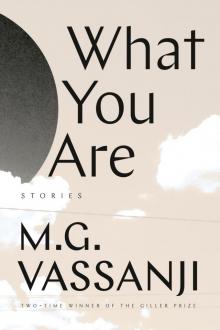 What You Are
What You Are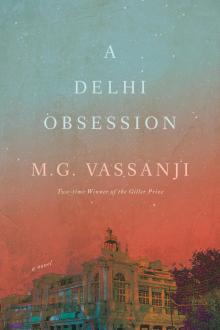 A Delhi Obsession
A Delhi Obsession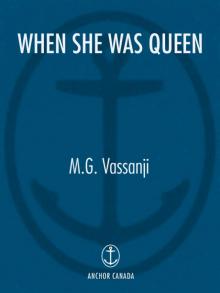 When She Was Queen
When She Was Queen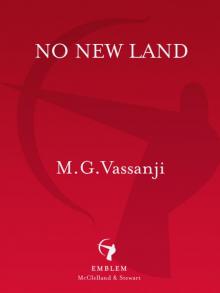 No New Land
No New Land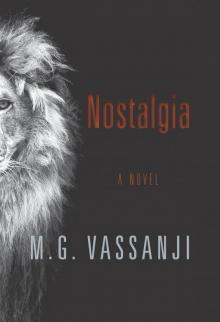 Nostalgia
Nostalgia Mordecai Richler
Mordecai Richler The Book of Secrets
The Book of Secrets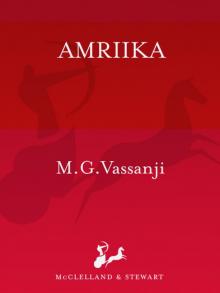 Amriika
Amriika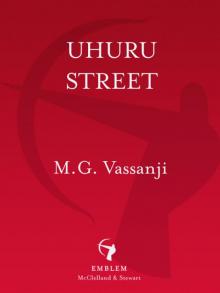 Uhuru Street
Uhuru Street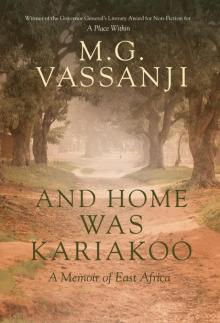 And Home Was Kariakoo
And Home Was Kariakoo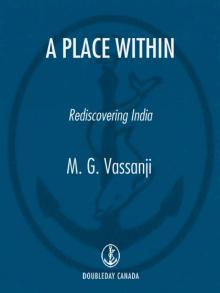 A Place Within
A Place Within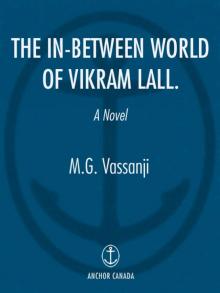 The In-Between World of Vikram Lall
The In-Between World of Vikram Lall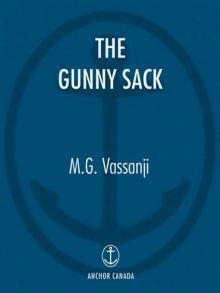 The Gunny Sack
The Gunny Sack